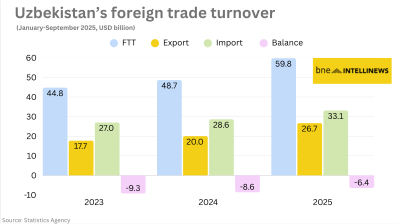The Albanian lek has risen above the symbolic threshold of ALL100 to the euro for the first time, reaching a record high against the European currency. Bank of Albania data showed that on August 12 the euro was exchanged at ALL99.95 in Albania.
The strong rise of the Albanian lek comes despite concerted efforts by the Bank of Albania to prevent the euro from slipping below ALL100. Since May, the central bank has intervened in the foreign exchange market, conducting direct purchases and engaging with commercial banks to avoid further devaluation.
However, with an influx of tourists to Albania during the summer months, these measures were not sufficient to maintain the euro at above ALL100 within Albania. Historically, exchange rate pressures peak between late July and early August.
Since 2020, the euro-lek exchange rate has fallen by nearly 20%, a decline largely attributed to the rapid growth of the tourism sector and an increase in foreign investments, particularly in real estate.
In the past two years, however, interventions by the Bank of Albania, coupled with short-term market panics, have disrupted the usual market patterns.
The central bank's interventions have slowed the annual decline of the euro-lek exchange rate, which is currently down by approximately 3.8% compared to a year ago. The Bank of Albania's actions are primarily aimed at controlling inflation, which has remained below the target of 3% for several months.
In July, annual consumer price inflation was reported at 2.1%, according to the national statistics agency Instat. Inflation measured by the Harmonised Index of Consumer Prices (HICP) reached 2.5% in June.
The Bank of Albania announced a reduction in its monetary policy rate from 3.25% to 3% in July, but kept the rate steady at its latest rate-setting meeting in August.
Previously, the strengthening of the lek helped the Albanian economy to weather the inflationary pressures of 2022 with relatively milder consequences compared to neighbouring countries such as North Macedonia. Additionally, the stronger lek has played a positive role in financial stability, improving the solvency of euro-denominated borrowers with incomes in lek.
However, the stronger lek has also had negative repercussions, particularly for the country's export-oriented sectors. Albania's trade deficit stood at ALL42bn (€419mn) in June, with exports of food, textiles and construction materials all falling in annual terms during the month, as the high value of the lek took its toll on Albanian exporters.
The country’s large textiles and footwear sector has suffered the most, with industry representatives warning in 2023 that 75,000 jobs were at risk as the high lek made exports less competitive. The tourism sector has also become less competitive.
Data

Turkey's central bank remains cautious, delivers 100bp rate cut
Decision comes on eve of next hearing in trial that could dislodge leadership of opposition CHP party.

Polish retail sales return to solid growth in September
Polish retail sales grew 6.4% year on year in constant prices in September, picking up from a 3.1% y/y rise in August, the statistics office GUS said.

Uzbekistan’s nine-month foreign trade nears $60bn
Export growth of 33% and import expansion of 16% y/y produce $6.4bn deficit.

Hungary’s central bank leaves rates unchanged
National Bank of Hungary expects inflation to fall back into the tolerance band by early 2026, with the 3% target sustainably achievable in early 2027 under the current strict policy settings.




